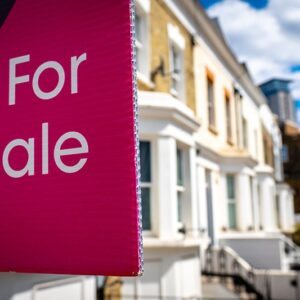How much do I need for a mortgage deposit?

This content is for information purposes only and should not be taken as financial advice. Every effort has been made to ensure the information is correct and up-to-date at the time of writing. For personalised and regulated advice regarding your situation, please consult an independent financial adviser here at Smith & Pinching in Norwich, Lowestoft and Eaton. The Financial Conduct Authority does not regulate taxation advice, estate planning or inheritance tax planning.
The UK is unique in Europe with its high rate of home ownership (65%). Yet getting onto the housing ladder is a common aspiration for many British people. The question is – how much money do you need to do this?
For most people, buying a property outright will be unrealistic. Rather, a mortgage will be required to buy one gradually. In 2023, this requires putting a “down payment” on the loan to show the lender that provides a degree of security.
How large should your deposit be? In this article, our Norwich financial planners explain the primary factors which can influence your target number – helping you form a clearer idea of the figure you should be aiming for.
We hope this content is helpful. If you want to discuss your financial plan with us, please get in touch to arrange a no-obligation financial consultation, at no cost to you:
01603 789966
Research different property prices
Mortgage deposits are often expressed as a percentage of a property’s value.
For instance, if a property is worth £300,000 and you want to take out a mortgage for that amount, then a 10% deposit would be £30,000.
This is why it is crucial to consider the type of property you want and the local market when determining the mortgage deposit you might need.
For instance, a flat will likely be cheaper than a house (all else being equal). Also, certain areas will offer higher or lower asking prices depending on their desirability. This is why a flat in inner London could cost more than a 3-bedroom house in Sheffield.
Be careful not just to consider current prices but also potential ones. After all, the property market does not stand still. For instance, average UK house prices rose from £167,716 in January 2013 to £290,000 ten years later.
This means that a £30,000 mortgage deposit could get you the property you want right now, but perhaps not in the future. Therefore, consider factoring the potential impact of house price growth into your calculations.
Watch out for lender requirements
Different lenders might have various “risk appetites” when it comes to lending money for a home. Some may impose more stringent affordability assessments. Banks might also vary in the loan-to-value (LTV) ratios they offer.
For example, some banks may be prepared to offer certain customers mortgage deals with a 95% LTV ratio. For a £300,000 mortgage, therefore, this would mean that the customer could put down a £15,000 deposit. Others may only be prepared to lend at a 90% maximum.
Various lenders may offer specialised deals to specific customers – e.g. first-time buyers or self-employed people. Do some research if you have unique circumstances that may require a dedicated lender, such as if you are looking for an expat mortgage.
Your credit score will be important in determining whether a lender is prepared to deal with you, and the mortgage products you can access. This could affect the amount of interest you pay on your repayments and how much of a deposit you require.
Do not neglect equity
In certain economic conditions, it may be possible to get a 95% mortgage.
Many first-time buyers are attracted to these deals as they offer the chance to get onto the housing ladder sooner, with a smaller mortgage deposit. Yet this does present an equity risk.
For instance, suppose you buy a £300,000 property with a 95% mortgage. This leaves you with a £285,000 mortgage debt to repay.
However, over the next 12 months, your property falls in value by 20%, to £270,000. At this point, the mortgage debt would outweigh the value of the property.
This is called “negative equity” and it should be avoided if at all possible, since you may be forced to sell at a loss. One way to protect yourself is by putting down a bigger deposit.
In the example above, a 10% deposit would produce a “break-even” point in equity. A 20% deposit would still leave the borrower with 10% positive equity.
Watch out for other charges
When saving for a mortgage deposit, it is possible to become so fixated on this that you forget about the other costs that come with buying a property.
Examples of major up-front costs include property valuation fees, surveyor’s fees, legal fees and possibly stamp duty (if the property is worth over £250,000, or £425,000 and you are a first-time buyer).
For your mortgage, there may also be a booking fee, an arrangement fee and a mortgage valuation fee. There are also costs involved with moving into your new home (e.g. storage costs). Consider making a full list of these and estimating their likely costs.
Conclusion & invitation
If you are interested in discussing your own financial plan or mortgage strategy with us, please get in touch to arrange a no-commitment financial consultation at no cost to you:
01603 789966




